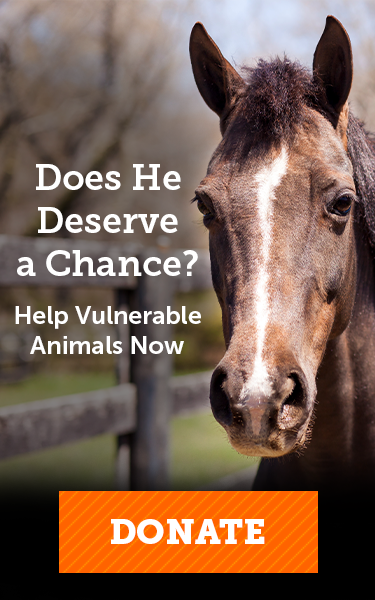
Planning for Equines and Exotics

It is very important to plan now for the future care of equines and exotics (i.e. primates, avians, large reptiles, big cats, etc.) Not only do these animals live longer than other companion animals, but they are more expensive to care for and require special living environments. For example, most equine owners are unable to drop off their horse with a friend or family member in the event of an emergency and may know only a few people who are willing and able to step in if a long-term care arrangement is needed. Please carefully consider the guidelines below when planning for the future care of an equine or exotic.
Planning for the Future Care of Equines
Know Your Horse:
- Since horses are social animals, it is important to consider the personality of your individual horse and what kind of care he/she is accustomed to. Some horses are more delicate than others and need additional, specialized attention. Furthermore, a show horse or a racehorse may require different care than a horse who is primarily a farm animal.
- You should consider if your horse will be housed on private property, a farm, or at a stable. Will they be around other animals, and if so, what kind and number? Asking yourself these questions will help you begin the process of determining what type of permanent living arrangement would be best for your horse in the event you are unable to care for them.
Do Your Research:
- When considering your horse’s future care, ask for references from veterinarians, reputable stables, equestrian properties and other equine owners about adoption opportunities in addition to individuals who may be willing to care for your horse if you were suddenly temporarily or permanently unable. There are reputable horse sanctuaries and rescue groups that may be willing to accept a horse as an “organization of last resort” should the intended future care arrangement become unavailable due to unforeseen circumstances.
Think About Funding:
- The ASPCA highly recommends providing funds for the future care of a horse because of the expense that comes with equine ownership. In this regard, please see our Funding Dos and Don’ts for further suggestions concerning funding.
Implement Your Plan:
- Even if you have not decided on all the details of your equine’s care, there are many things an equine owner can do in the interim to begin the process of planning for future care. Please see our analysis of informal vs. formal arrangements to decide which arrangement works best for you.
Planning for the Future Care of Exotics
An animal who is not considered a companion animal (dog, cat, rabbit, fish, etc.) will require extra attention and careful planning when arranging for their future care. Unusual or unfamiliar species are less likely to be welcomed by family members or friends, so it is never too early to start thinking about who can step in and provide a home if needed. Consider sanctuaries and special retirement homes that can provide continuous care for unusual species and make arrangements far in advance. A pet trust may also be a good option for these types of animals. See our Pet Trust Primer for more information.
